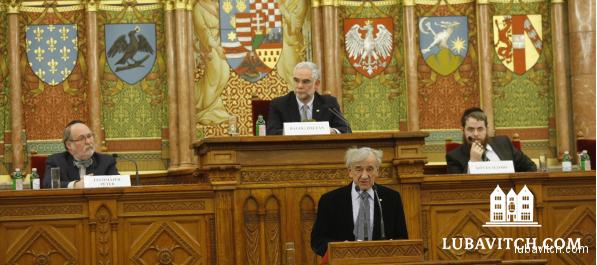(lubavitch.com) On a rare visit to Hungary this week, Holocaust survivor Elie Wiesel applauded Chabad-Lubavitch for its work reviving Jewish life in his native country.
The Nobel Laureate was invited to an event at the Hungarian Parliament honoring Chabad of Hungary on its 20th anniversary. Speaking in English and Hungarian to an audience of about 600, including political and Jewish leaders, he reminded his listeners that the Jewish people are “the only people of antiquity to have survived antiquity.”
Wiesel, 81, recalled the day he and his family were driven out of his home in Máramarossziget and deported to the concentration camps.
More than 550,000 Hungarian Jews were murdered in the Holocaust. By the end of WWII, it seemed certain that the country’s Jewish life was completely obliterated.
Today, Hungary has the third largest Jewish population (100,000) in Central and Eastern Europe. When they arrived in 1989, Rabbi Boruch and Batsheva Oberlander began to rebuild. Jewish schools, synagogues, kosher eateries, a mikvah, Chabad-on-Campus, and a rabbinical college are now integral to the city’s Jewish community.
Wiesel, a celebrated author and activist, implored his former Hungarian landsmen to obtain national pride “by a desire to humanize destiny,” and his fellow Jews to remain true to their identity and “stay together.”
“The enemy—ours as well as mankind’s—sought to destroy us by eliminating our memory; he failed. And you constitute living proof to his defeat. That is why our presence here, among the nation’s lawmakers is so moving to me.”
The event was coordinated by Parliament’s Committee on Religion, Minority and Human Rights led by Mr. Zoltan Balog in partnership with Rabbi Shlomo Koves, one of Chabad’s representatives to Budapest and Executive Rabbi of EMIH Jewish community. Also participating were representatives of Hungary’s Mazsihisz Neolog communities.
Hungarian Prime Minister Gordon Bajnai echoed Mr. Wiesel’s remarks as he called upon his government to eliminate all tolerance for anti-Semitism. With the far right Jobbik Party having made strong electoral gains in the EU over the summer, the country’s Jews have reason to be concerned about anti-Semitism.
Rabbi Koves, himself a native Hungarian who knocked on the Oberlanders’ door while yet a young boy agitating for spiritual meaning, spoke passionately to the Jewish participants, urging them not to “give up your Jewish identity, your three thousand year old spiritual heritage in order to be something else.”
As members of parliament looked on, Wiesel was joined by Rabbi Koves and Mr. Yossi Priel in presenting a medal of honor to Rabbi and Mrs. Oberlander, Chabad’s senior shluchim to Hungary.
In his remarks, Wiesel recalled the teachings of the Lubavitcher Rebbe: “Whatever you do, wherever your life may lead you, stay Jewish. Do not allow others to determine the quality of our faith . . .”
Apropos to the setting, the entire house—Jews and gentiles—joined in singing the popular Hungarian Jewish folksong, Szól a Kakas Már (The Rooster is Crowing), with its allegoric references to the timeless yearning of the Jewish people for the redemption.

Be the first to write a comment.